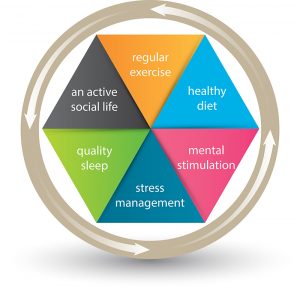Just in case you need another reason to watch your waistline, researchers at the National Institutes of Health (NIH), provide you with a compelling one; new research says midlife obesity may influence not only the chances of developing Alzheimer’s disease, but how early it will develop as well.
 Midlife obesity has long been seen as a causative factor for increasing the risk of Alzheimer’s. But closer observation shows that being obese at age 50 may affect the age, years later, when Alzheimer’s strikes.
Midlife obesity has long been seen as a causative factor for increasing the risk of Alzheimer’s. But closer observation shows that being obese at age 50 may affect the age, years later, when Alzheimer’s strikes.
Among those who did develop the disease, the speed of the onset of Alzheimer’s was directly proportional to the number of extra midlife pounds – the more pounds, the faster the onset.
About five million people in the U.S. are living with Alzheimer’s disease, a number that is expected double by 2050 as the population ages.
Alzheimer’s disease starts eating away at the brain more than a decade before symptoms appear. As there is no cure as of yet, the best way to keep it at bay is by adopting healthy lifestyle choices.
As part of the new study, the team used data from the Baltimore Longitudinal Study of Aging, one of the longest-running projects to track what happens to healthy people as they get older.
From their analysis of the records of 1,400 participants who had undergone regular cognitive testing every year or two for about 14 years, the researchers noted that 142 participants developed Alzheimer’s.
The next step was to check how much these people weighed when they were 50 years old and still in good brain health.
They found that among this group of Alzheimer’s patients, people who had been obese (BMI of 30 or more) at 50 developed symptoms of Alzheimer’s about a year earlier than those whose midlife BMI was 28. It must be remembered that the threshold for being overweight is a BMI of 25. The study also revealed that even if they didn’t develop dementia, the effects of obesity was evident in the brain-clogging hallmarks of Alzheimer’s years later.
Some facts about obesity
 A person is considered obese if his/her bodyweight is at least 20% higher than it should be.
A person is considered obese if his/her bodyweight is at least 20% higher than it should be.- A Basal Metabolic Rate (BMI) between 25 and 29.9 is considered overweight, and a BMI over 30 is considered obesity.
- In the U.S. more than 35 percent of adults are obese and more than 34 percent are overweight.
- 17 percent of all children and adolescents in the U.S. are obese.
- Almost a third of all children and adolescents in the U.S. are either obese or overweight.
There are many reasons why some people tend to put on weight while others don’t. However, the common reasons for obesity are:
- Consuming too many calories
- Leading a sedentary lifestyle
- Not sleeping enough
- Endocrine disruptors, such as some foods that interfere with lipid metabolism
- Fructose effect on the brain may promote obesity
- Quitting smoking
- Medications that make patients put on weight
- Obesity gene
Obesity prevention and you
 Whatever your current status may be – whether you’re at risk of becoming obese or currently at a healthy weight, you can follow simple measures to prevent unhealthy weight gain and help avoid the related health problems. You don’t necessarily have to join a fitness club or spend hundreds of dollars on some fancy diet. You can follow simple steps at home:
Whatever your current status may be – whether you’re at risk of becoming obese or currently at a healthy weight, you can follow simple measures to prevent unhealthy weight gain and help avoid the related health problems. You don’t necessarily have to join a fitness club or spend hundreds of dollars on some fancy diet. You can follow simple steps at home:- Exercise regularly
- Take the stairs instead of the elevator
- Follow a healthy low-calorie, nutrient-dense eating plan
- Know and avoid the food traps that cause you to overeat
- Monitor your weight regularly
If you are consistent in following the above simple tips, your pounds will slowly drop off and stay off. Of course, as you can imagine, willpower will play a huge role here.
Other additional risk factors of Alzheimer’s disease
 While obesity is a factor that leads to Alzheimer’s disease, there are other factors that play a role in this (as of yet) incurable disease. The common risk factors are:
While obesity is a factor that leads to Alzheimer’s disease, there are other factors that play a role in this (as of yet) incurable disease. The common risk factors are:
Age: Increasing age is the greatest known risk factor for Alzheimer’s.
Family history and genetics: Your risk of developing Alzheimer’s disease appears to be somewhat higher if a first-degree relative — your parent or sibling — has the disease.
Sex: Women may be more likely than men to develop Alzheimer’s disease, in part because they live longer.
Mild Cognitive Impairment (MCI): People with MCI have an increased risk — but not a certainty — of later developing dementia.
Past head trauma: People who’ve had a severe head trauma or repeated head trauma appear to have a greater risk of Alzheimer’s disease.
Lifestyle and heart health: Poor lifestyle choices like unhealthy diet, smoking, lack of exercise and alcohol consumption are all risk factors for Alzheimer’s disease.
Brain Activity: People who maintain an active social life and do mentally and socially stimulating activities have a reduced risk of Alzheimer’s disease.
Early Signs and Symptoms of Alzheimer’s disease
If memory problems get progressively worse to the extent that they are seriously affecting your daily life, it could be an early sign of Alzheimer’s. Other signs include:
- Trouble planning and problem solving
- Daily tasks are a challenge
- Confusing times and places
- Changes in vision
- Words and conversations are frustrating
- You lose things
- Lapse in judgment
- Social withdrawal
- Mood changes
Alzheimer’s disease prevention: A few tips
Alzheimer’s is a complex disease with multiple risk factors. Some of these factors, like your age and genetics, are outside of your control. But you can do something about the other factors that influence the onset of this disease, and keep it at bay for a long time if not forever.
To help prevent Alzheimer’s disease employ the six pillars of brain-healthy lifestyle:
- 1. Regular exercise
- 2. Healthy diet
- 3. Mental stimulation
- 4. Quality sleep
- 5. Stress management
- 6. An active social life
The obesity/Alzheimer’s study is the first to link brain changes to obesity. It also adds a lot of incentive to the Alzheimer’s long-recommended slogan: “What’s good for your heart is good for your brain.”
Sources:
http://www.medicalnewstoday.com/info/obesity
http://www.twcc.com/articles/2015/09/01/s/study-midlife-obesity-may-spur-risk-for-earlier-alzheimer
http://www.afp.com/en/news/overweight-midlife-may-speed-alzheimers-study
http://www.nichd.nih.gov/health/topics/obesity/conditioninfo/pages/risk
http://www.mayoclinic.org/diseases-conditions/obesity/basics/prevention
http://www.mayoclinic.org/diseases-conditions/alzheimers-disease/basics/risk-factors
http://www.alz.org/alzheimers_disease_10_signs_of_alzheimers
http://www.helpguide.org/articles/alzheimers-dementia/alzheimers-and-dementia-prevention
http://www.medicalnewstoday.com/info/obesity
http://www.twcc.com/articles/2015/09/01/s/study-midlife-obesity-may-spur-risk-for-earlier-alzheimer
http://www.afp.com/en/news/overweight-midlife-may-speed-alzheimers-study
http://www.nichd.nih.gov/health/topics/obesity/conditioninfo/pages/risk
http://www.mayoclinic.org/diseases-conditions/obesity/basics/prevention
http://www.mayoclinic.org/diseases-conditions/alzheimers-disease/basics/risk-factors
http://www.alz.org/alzheimers_disease_10_signs_of_alzheimers
http://www.helpguide.org/articles/alzheimers-dementia/alzheimers-and-dementia-prevention

No comments:
Post a Comment